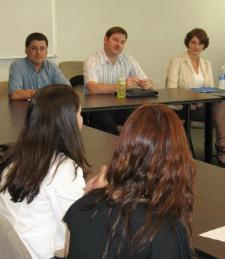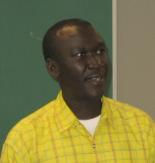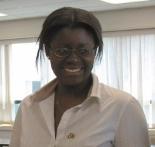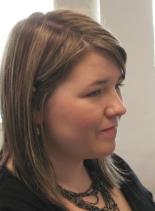Charting a Course
In the summer of 2007, eight arts students piloted a new program designed to help them chart a course from classroom to successful career. 
ArtsWorks focuses on helping students discover how the skills and knowledge they’re gathering while in pursuit of a bachelor of arts can be turned into tangible future employment or further study.
At their final session, students in the program gained insight from successful arts graduates.
Tracy Chapman, who graduated from Memorial in 1989, is now a senior policy analyst at Transport Canada. She detailed her career path in the federal government, which began with a job at Canada Customs and Revenue in St. John’s.
“A BA is beneficial because it teaches you how to think – and when you’re an analyst, that’s what you need to do,” she explained.
Darryl Hooper, a Criminal Investigator for Canada Border Services, studied French and English at Memorial. During his studies, he was able to get summer jobs in the federal government, and after his 1991 graduation, quickly parlayed that experience into a career with Canada Customs.
“Your job,” he told the students, “is to try to get all the way in the door, and then close the door behind you.”
He explained the direct link between the “who, what, where, when and why focus” of an arts education and the work he does now. “As as investigator, it’s all about the who, what, where, when, why. I have to be able to listen and understand what people are saying, and then put it together.”
Russell Wangersky, who holds a BA Honours from Acadia University, recalled: “When I told my parents I was going into arts, they were horrified. When I told them I was majoring in philosophy, they were terrified.”
That choice, however, led to a successful media career in television and print. Now the editor of The Telegram in St. John’s, he believes that the ideal newsroom would boast journalists from a wide range of academic backgrounds.
“An arts degree let’s you roll with the punches – and journalism is very much a roll with the punches thing,” he explained.
Despite his parents’ fears, he said he's been steadily employed since graduation; Mr. Hooper and Ms. Chapman echoed that.
And Mr. Hooper noted that among the recent hires at Canada Border Services, about half have a BA, while Ms. Chapman said most jobs she sees come up in the federal government today require a background in the social sciences.
“Don’t let anybody tell you that a BA won’t take you anywhere. I’ve spoken in the United Nations, and I’ve sat at OECD (Organisation for Economic Co-operation and Development) meetings,” she told the students. “It’s up to you to be able to tell them and show them what you can do.”
STUDENTS talk about the value of ArtsWorks
ArtsWorks participants also learned to use campus academic and student services to their advantage, and gain hands-on experience through a 10-hour placement in  a community organization.
a community organization.
For David Taban, a sociology major, that included a first chance to work directly with children. “I did not know how that would be, but I was able to adapt as my understanding began to change.”
He also noted that the job search skills and information on studying outside of Canada were very useful to him. “There was great value to this program,” he said. “I learned how to market myself.”
For Danai Kusikwenyu, a third-year English student, the greatest value was in finding a focus through self-assessment exercise s.
s.
“You discover things about yourself that you didn’t realize.” In her case, she learned that her strengths in communication and writing pointed at just what she hopes to do. “The self assesment not only tells you what kinds of things you are more inclined to like to do, but also what jobs out there would complement these things.”

English major Sarah McHugh, on the other hand, has long known she plans to pursue a law degree when she completes her studies, which include a minor in Law and Society.
“There are different degrees of lost. I knew what I wanted to do but I didn’t know how to get there, who I needed to get in cahoots with,” she said. “I made so many connections, and now I have a much clearer plan.”